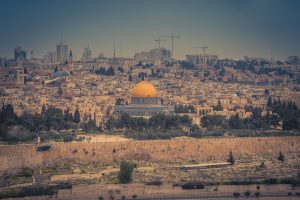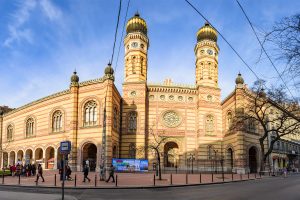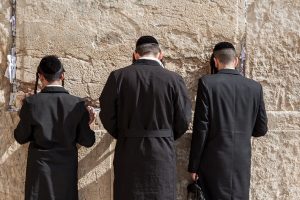Known as the Festival of Lights, Hanukkah (also known as Chanukkah) is an eight day Jewish festival noted for its historic origins. Celebrated normally during November or December each year, Hanukkah always begins on the 25th day of the Jewish month of Kislev commemorating the victory in 165BC of the Maccabees over Antiochus Epiphanes (C.215 – 164BC).
The most commonly accepted theory by practising Jews is that of the rededication of the Temple of Jerusalem. During the era of the Second Temple, when Judea was ruled by the Seleucids (successors of Alexander the Great), people of the Jewish faith struggled to preserve their religious principles and practices in the face of progressively expanding Greek influence. Though the Jewish people were shown religious tolerance, the rising of Antiochus IV brought a shift. Throughout the Seleucid Empire, Israelites were persecuted and forced to assimilate to the Hellenistic life-style. Even amongst the most devout of Israelites, there were some who began to succumb to the idolatrous practices of the Greeks. As the commonly accepted accounts of the story relate, in 167 BCE, Antiochus ordered the placement of a monument devoted to Zeus in the Temple in Jerusalem. As was the custom with such monuments, Hellenistic ritual dictated that pigs must be sacrificed at the altar of Zeus. When the Greeks ordered the Israelites to conduct the ritual at the Temple, an individual stepped forward to comply. It is said that Mattathias, a prominent Jewish priest who was leading a revolutionary group against foreign influence, killed both the acceding Jew and the guard who gave the order on the spot. Though Mattathias died soon after, his son went on to lead the movement of Maccabbees dedi-cated to the struggle against the Greeks.
The Jewish people finally succeeded in their revolt against the Seleucid monarchy in 165 BCE, when they were able to claim the Temple once again. The Talmud relates that upon re-entering the Temple, the Israelites were dismayed at the state in which they found it. The Greeks had defiled everything, including the sacred olive oil that was needed to keep the menorah (7 branched candlabra) lit at all times. In their attempts to restore the Temple, the Israelites found a single container of the sacred oil and used it to light the menorah with the expectation that it would only be enough to sustain one day. Much to their surprise, they found that the oil maintained the flame for eight days, enough time to produce more olive oil to replenish the Temple’s store.
The leaders of the Maccabbees consecrated the 25th day of Kislev every year to commemorate the success of the Israelites against the Seleucids and the rededication of the Temple. Thus, in keeping with tradition, Hanukkah is celebrated over a period of eight days, each day symbolising the strength of the flame in the rededicated Temple. While no Jewish scripture explicitly speaks of Hanukkah, the lighting of candles on the menorah during the festival is seen as a religious prescription. The Hanukkah Menorah is a candela-brum with nine branches, called in Hebrew Chanukiyyah. Eight branches of equal size represent the eight miracle days. The ninth candle holder, usually placed separately, is for Shamesh. Because Hanukkah candles can only be used for viewing purposes, the Shamesh candle is used to light the other eight candles. Starting on the first day of Hanukkah, Jewish families are to light one candle per day for eight days. The symbolism of this action is intended to commemorate the success and miraculous nature of the Jewish struggle against the Greeks. The Jewish people have been encouraged, in fact, to display their menorahs outside their doors or in their windows when it is safe in order to disseminate the story of their success and survival.
Other rituals include eating fried foods (to emphasise the importance of oil in this festival) and playing dreidel. During the time of Antiochus’ oppression, resisting Israelites would study the Torah in the presence of guards under the guise of playing this game. The dreidel is composed of a square top marked with four Hebrew letters constituting the phrase: “A great miracle happened there.”
Another remnant of the period of oppression is represented through the consumption of dairy products. During Antiochus’ rule, it was decreed that women would have sexual relations with a Greek governor before marriage. One woman, by the name of Yehudis (Judith), was summoned by a nearby governor and acceded to his wishes. She managed to intoxicate the governor with cheese and wine and then proceeded to behead him. To remember Yehudis’ achievement, dairy foods are often an important part of Hanukkah celebrations.
Accompanying these traditions is the prayer recited three times a day during each day of the celebration of Hanukkah:
‘We thank You for the miracles, for the redemption, for the mighty deeds and triumphs, and for the battles which You performed for our fathers in those days at this season. In the days of the Hasmonean High Priest Mattathias ben Yohanan and his sons, when a wicked Hellenic government rose up against Your people Israel to make them forget Your Torah and transgress the laws of Your will, You in great mercy stood by them in the time of distress. You championed their cause, defended their rights and avenged their wrong; You delivered the strong into the hands of the weak, the impure into the hands of the pure, the wicked into the hands of the righteous, and the arrogant into the hands of the students of Torah. You made a great and holy Name for Yourself in the world, and for Your people You performed a great deliverance until this day. And after this, Your children entered the shrine of Your house, cleansed Your Temple, purified Your sanctuary, kindled lights in Your holy courts, and established these eight days of Channukah for giving thanks and praise to Your great Name.’
Though Hanukkah is not considered by Jews to be the festival of most religious significance, its importance is rooted in its historical symbolism and remembrance of success in the face of oppression.
References:
https://www.jewishvirtuallibrary.org/jsource/Judaism/holiday7.html
https://www.jewfaq.org/holiday7.htm
https://www.torah.org/learning/halacha/classes/class139-8.html
https://www.hillel.org/jewish/holidays/chanukah/default.htm




Add Comment